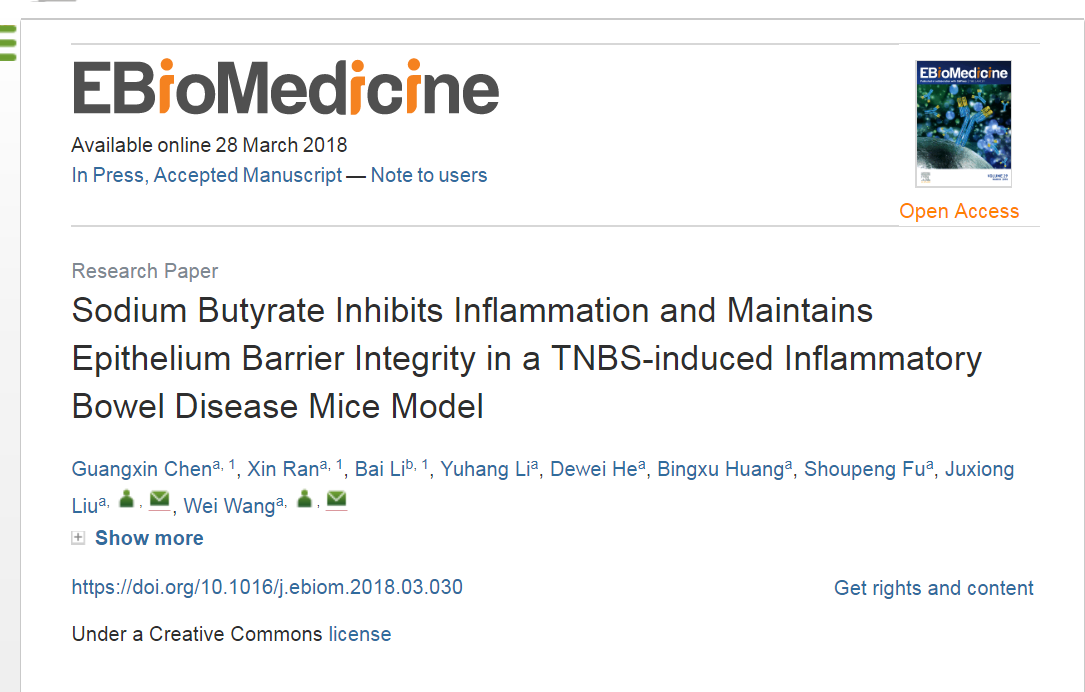 近日,动物医学学院柳巨雄教授课题组在肠道健康研究领域又有新发现。他们证实,丁酸能够抑制腹腔巨噬细胞炎性细胞因子的分泌,从而有效改善实验性结肠炎动物模型的肠道屏障功能和局部炎症反应。研究文章《Sodium Butyrate Inhibits Inflammation and Maintains Epithelium Barrier Integrity in a TNBS-induced Inflammatory Bowel Disease Mice Model》被《EBioMedicine》杂志接收发表。该杂志是由医学顶尖期刊《The Lancet》和《Cell》联合支持的开源期刊,分类属医学一区杂志。旨在促进基础医学向临床医学的转化。
近日,动物医学学院柳巨雄教授课题组在肠道健康研究领域又有新发现。他们证实,丁酸能够抑制腹腔巨噬细胞炎性细胞因子的分泌,从而有效改善实验性结肠炎动物模型的肠道屏障功能和局部炎症反应。研究文章《Sodium Butyrate Inhibits Inflammation and Maintains Epithelium Barrier Integrity in a TNBS-induced Inflammatory Bowel Disease Mice Model》被《EBioMedicine》杂志接收发表。该杂志是由医学顶尖期刊《The Lancet》和《Cell》联合支持的开源期刊,分类属医学一区杂志。旨在促进基础医学向临床医学的转化。
慢性结肠炎是一种慢性、反复性、多发性、因各种致病原因导致的肠道炎性水肿,溃疡、出血病变。丁酸作为肠道膳食纤维由微生物发酵的主要终末产物之一,是肠上皮细胞重要能量来源,它维持肠道内稳态,调节免疫应答与氧化应激反应,增强结肠黏膜的防御屏障,改善肠道通透性,并影响着慢性结肠炎的发生发展过程。柳巨雄课题组近年来一直从事肠道屏障调控及GPR109A生物功能研究,他们发现,丁酸可以通过激活腹腔巨噬细胞GPR109A受体,抑制炎性细胞因子的分泌,从而减轻结肠局部炎症反应,增强肠道机械屏障功能。上述发现不仅对于揭示丁酸与GPR109A受体的生物学功能具有重要的意义,同时也为治疗慢性结肠炎提供了新的思路,通过GPR109A受体,抑制腹腔巨噬细胞的激活可以做为干预和治疗慢性结肠炎的一个有效靶点。
该研究受到国家自然科学基金(31572479, 31702211, 31602020)和吉林大学研究生创新基金(2017168)的资助。主要完成者为陈广信博士,这已经是其在柳巨雄教授和王玮副教授指导下完成的第四篇SCI文章。
Researchers discovered targeting GPR109A anti-inflammatory and pro-intestinal epithelium barrier functions is a new strategy for IBD treatment
In an exciting discovery, researchers of Animal physiology department in College of Animal Veterinary Medicine find that inhibition of macrophages with sodium butyrate by targeting GPR109A have a protective effect on experimental colitis. their research paper was accepted by 《EBioMedicine》,which was published in collaboration with CellPress and LANCET.
Researchers assessed the anti-inflammatory activity of sodium butyrate (SB) on 2,4,6-trinitrobenzene sulfonic acid (TNBS)-induced colitis mice, an experimental model that resembles Crohn’s disease, and explored the potential mechanism of SB in inflammatory bowel disease (IBD). SB significantly ameliorated the inflammatory response and intestinal epithelium barrier dysfunction in TNBS-induced WT mice, but failed to provide a protective effect in TNBS-induced GPR109a−/− mice. They also demonstrated that inhibiting release of Inflammatory cytokines from macrophages by sodium butyrate will attenuate intestinal epithelium barrier dysfunction and reduce colon inflammation.
These findings therefore extend the understanding of GPR109A receptor function and sodium butyrate on intestinal health, they also provide a new theoretical basis for treatment of IBD.
This study was supported by National Nature Science Foundation of China (31572479, 31702211, 31602020) and Graduate Innovation Fund of Jilin University (2017168).